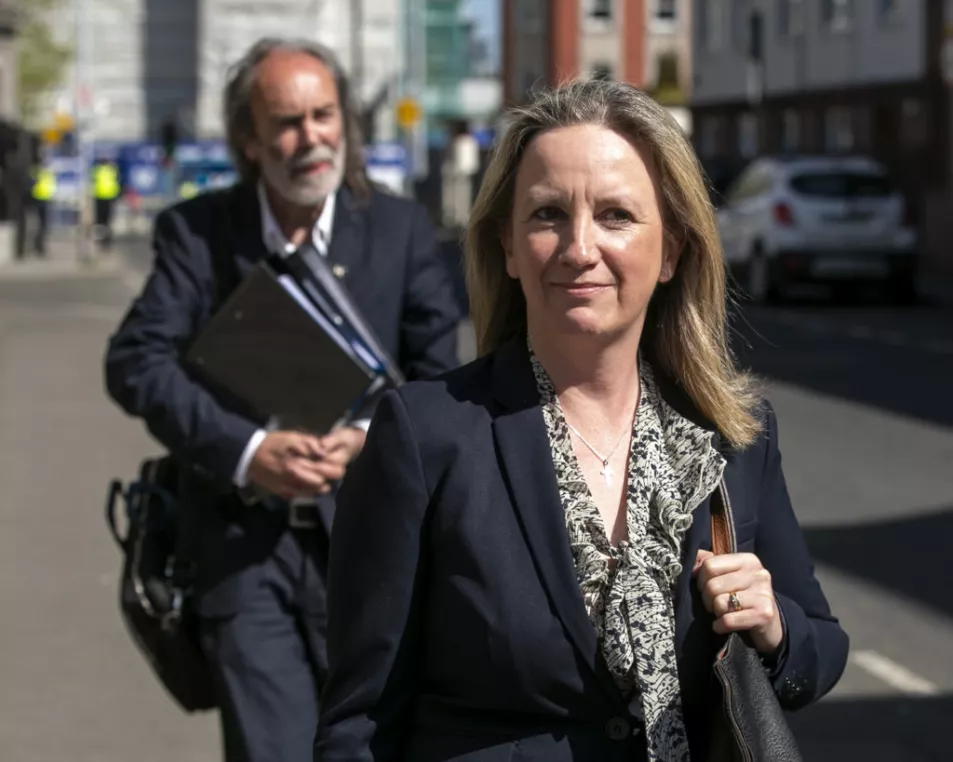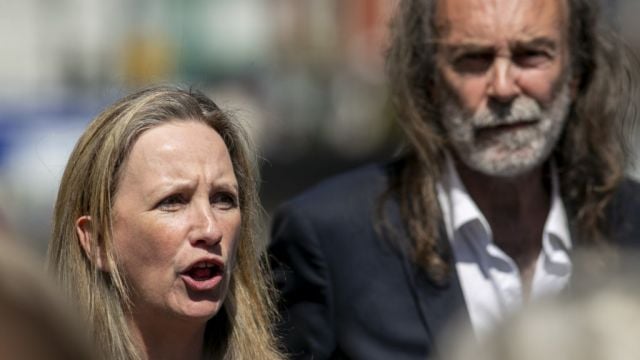Updated: 3.15pm
The Supreme Court has upheld a decision to dismiss Gemma O'Doherty and John Waters' challenge against the constitutionality of laws introduced in response to the Covid-19 pandemic.
In a six to one majority decision, the Supreme Court's ruling brings to an end a controversial legal action before the courts that commenced shortly after the State introduced various regulations, restrictions and measures in response to the Covid-19 pandemic over two years ago.
Ms O'Doherty and Mr Waters' appeal was against a decision by the High Court, later upheld by the Court of Appeal (CoA), not to grant them permission to bring their action against the measures on the basis it was "misconceived and entirely without merit".
Giving the Supreme Court's lead judgement on Tuesday, Chief Justice Donal O'Donnell said the High Court was correct to refuse to grant leave in this case.
The Chief Justice, High Court President Ms Justice Mary Irvine, Mr Justice John MacMenamin, Ms Justice Iseult O'Malley, Ms Justice Marie Baker, and Mr Justice Brian Murray all upheld the lower courts' findings.
Giving the court's decision, the Chief Justice held that, as a general rule, the absence of expert or technical evidence cannot be a basis for the refusal of permission to seek to bring a judicial review action over the validity of legislation.
However, the court held that evidence is required where the legislation challenged recites circumstances as to why it is deemed necessary.
In the case raised by Ms O'Doherty and Mr Waters, such expert evidence had not been adduced, the court held.
Justification
The Supreme Court also rejected the contention that there was a burden on the State to justify legislative measures that interfere with constitutional rights.
In a separate decision, Mr Justice Gerard Hogan said he would have allowed the appeal on certain grounds only.
The Supreme Court had agreed to hear their appeal on issues concerning the limitations on rights and the proportionality of the measures challenged.
In their judicial review proceedings against the State and the Minister for Health, with the Dáil, Seanad and Ceann Comhairle as notice parties, the applicants sought to have various legislative measures declared unconstitutional and flawed.
The appeal was opposed by the State, represented in the proceedings by Michael Collins SC and Patrick McCann SC.
The State argued that the lower courts' decisions should remain undisturbed and the appeal should be dismissed.
The High Court and the CoA's findings that the applicants had not produced sufficient evidence to the court to support their arguments and showed their claims were at least arguable were correct, the State argued.
Mr Waters had argued the High Court was wrong not to grant him and Ms O'Doherty leave. Sufficient evidence had been put before the High court to show that their claims were arguable, he said.
He also claimed the measures, such as the lockdown, brought in over a pandemic he did not believe existed, had fundamentally and impermissibly breached fundamental constitutional rights that he and other citizens enjoy.
He argued no due diligence was carried out by the State in relation to "the draconian" and alleged unconstitutional measures that were introduced.
'No different to the common cold'
Ms O'Doherty had argued the measures were taken over a virus that was "no different to the common cold."
They also claimed the measures created a regime "akin to martial law", were disproportionate, and that there were other steps that were less onerous and less limiting of personal freedoms that could have met public health concerns.
They also said the introduction of the legislation at a time when there were a small number of Covid-19 cases in the State was disproportionate, and these unlawfully and unjustifiably restricted rights contained in the Constitution and European Convention on Human Rights (ECHR).
Ms O'Doherty and Mr Waters, who represented themselves in proceedings, had challenged legislation, including the 2020 Health Preservation and Protection and Other Emergency Measures in the Public Interest Act; the 2020 Emergency Measures in the Public Interest Act Covid-19 Act and the 1947 Health Act (Affected Areas) Order.
In May 2020, Mr Justice Charles Meenan refused to grant them leave, saying their claims were not arguable.
He said they had not provided any expert evidence or facts to support their view the laws were disproportionate or unconstitutional.
Last year, the CoA dismissed all grounds of their appeal.

Mr Justice Birmingham said the court was "quite satisfied" the approach taken by the High Court in relation to their case was correct.
The "controversial and tendentious" case presented no serious legal issue that would justify the granting of permission, the CoA also found.
Giving the Supreme Court's decision, the Chief Justice said expert evidence is not essential to challenge the constitutional validity of any legislative provision, nor was such evidence essential when a challenge is based on a claim of lack of proportionality.
Mr Justice O'Donnell said that in order for the applicants' claim to succeed, some plausible evidence to establish that they had an arguable case was required.
He said that evidence concerning the impact the State's measures had on the applicants, and an analysis of how the measures affected the Constitution, or material to contradict the State's assessment of the pandemic, should have been put before the court.
The applicants also needed to put evidence before the court to support the core of their case that the regulations and restrictions were part of some global conspiracy to undermine citizens' rights.
The Judge said that to make this part of their case, "some plausible foundation in evidence was required".
The Chief Justice said none of the type of evidence required for leave to be granted was put before the court by the applicants.
The High Court was correct not to grant leave on this or on any alternative basis, as suggested by Mr Justice Hogan in his dissenting decision, the Chief Justice said.
Dissent
In his judgement, Mr Justice Hogan said he agreed with a lot of what was contained in the majority decision.
However, he said there was an element of their case where leave should have been granted.
He said the measures introduced which had impacted on various constitutional rights such as general prohibitions on public protest, freedom to travel, limitations on the number of visitors to people's houses called for the "closest judicial scrutiny".
Leave, he said, should have been granted because of the impacts the measures had on various constitutional rights and regulations.
He said these included the limitations on the right to protest and in relation to the regulations that confined people to travelling no further than 2km from their homes.

In his decision, he noted that some of the regulations, such as the limitation on visitors in people's homes, may not have posed a constitutional issue in the short term, but held that it would not have been possible for such a measure to exist in the long term.
Mr Justice O'Donnell added that he respects the concerns raised by Mr Justice Hogan to dissent.
The matters raised by him are something that should be of genuine concern to policymakers, lawmakers, and the public, he said. Those issues, he added, were part of the reason why the Supreme Court had agreed to hear the appeal.
Mr Justice O'Donnell said he did not agree that it would be permissible for the court to attempt the radical surgery necessary to convert the proceedings that were before the court into the almost entirely different claim envisaged by his colleague.







